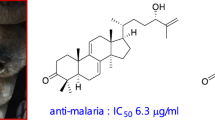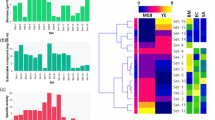Abstract
THE testing of the antibacterial activity of fungus (Basidiomycete) metabolism solutions in this Laboratory is done by floating a 10-mm. disk cut from an agar-plate colony of the fungus, on 25 ml. of the medium, usually potato dextrose agar or malt agar, and testing the metabolism solution so produced every five days by the method previously described1 against agar plates bulk-seeded with the test bacteria, Bacterium coli and Staphylococcus aureus respectively. The result is expressed as the diameter of the area of the bacterial inhibition in millimetres.
This is a preview of subscription content, access via your institution
Access options
Subscribe to this journal
Receive 51 print issues and online access
$199.00 per year
only $3.90 per issue
Buy this article
- Purchase on Springer Link
- Instant access to full article PDF
Prices may be subject to local taxes which are calculated during checkout
Similar content being viewed by others
References
Wilkins, W. H., Ann. App. Biol., 36, 257 (1949).
Author information
Authors and Affiliations
Rights and permissions
About this article
Cite this article
WILKINS, W., REES, J. Production of Antibacterial Metabolism Solutions by Fungi. Nature 166, 949–950 (1950). https://doi.org/10.1038/166949b0
Issue Date:
DOI: https://doi.org/10.1038/166949b0
Comments
By submitting a comment you agree to abide by our Terms and Community Guidelines. If you find something abusive or that does not comply with our terms or guidelines please flag it as inappropriate.



